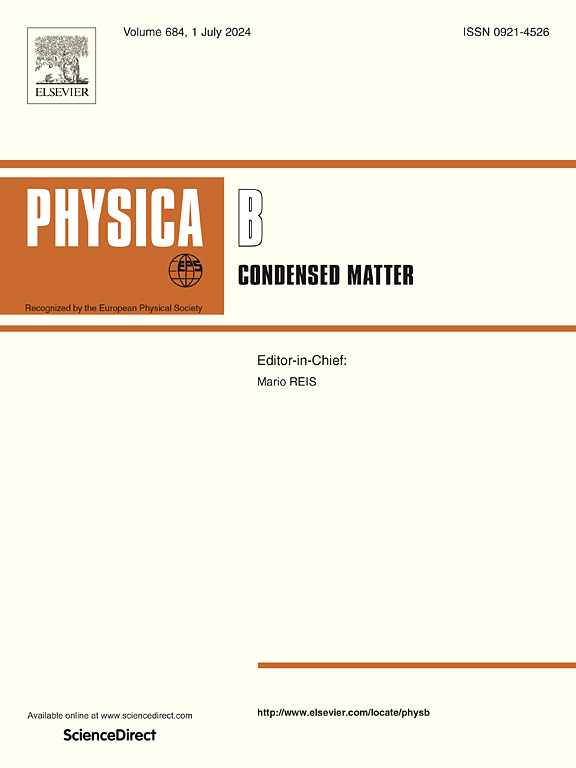Influence of bismuth content on the properties of glass-ceramics with composition xBi2O3-(0.40-x)B2O3-0.15ZnO-0.45P2O5: Synthesis, structural, thermal analysis, and dielectric relaxation process
IF 2.8
3区 物理与天体物理
Q2 PHYSICS, CONDENSED MATTER
引用次数: 0
Abstract
The glass-ceramics materials with the sample composition of xBi2O3-(0.40-x) B2O3-0.15ZnO-0.45P2O5 (BBZP) (where x = 0.10, 0.15, 0.20, and 0.25) have been prepared using the conventional melt-quenching technique. Different nanocrystalline phases embedded inside the glass-ceramic matrix have been characterised by analysing x-ray diffraction spectra. The obtained density values as well as molar volume increases with the rise of bismuth content. The network structure of the glass ceramic samples has been investigated employing Raman spectroscopy. The DSC analysis reveals the decrease in Glass transition temperature (Tg) (433K–416K), and crystallisation temperature (Tc) (569K–556K) of the studied materials. The electrical properties of the samples have been investigated in the context of dielectric and modulus formalism. Different theoretical models have been employed to analyse the experimental data of dielectric and modulus spectra. The Nyquist plots of the materials have also been analyzed employing relevant models. It has been shown that the higher bismuth containing samples are highly dense with high thermal stability. Such materials also have high dielectric strength. Analysis of these performance indicators suggests the possible applications of these materials in electrochemical devices.
铋含量对成分为 xBi2O3-(0.40-x)B2O3-0.15ZnO-0.45P2O5 的玻璃陶瓷特性的影响:合成、结构、热分析和介电弛豫过程
采用传统的熔淬技术制备了样品成分为 xBi2O3-(0.40-x) B2O3-0.15ZnO-0.45P2O5 (BBZP) (其中 x = 0.10、0.15、0.20 和 0.25)的玻璃陶瓷材料。通过分析 X 射线衍射光谱,对玻璃陶瓷基体中嵌入的不同纳米晶相进行了表征。得到的密度值和摩尔体积随着铋含量的增加而增大。拉曼光谱对玻璃陶瓷样品的网络结构进行了研究。DSC 分析表明,所研究材料的玻璃转化温度(Tg)(433K-416K)和结晶温度(Tc)(569K-556K)有所降低。在介电和模量形式的背景下研究了样品的电特性。我们采用了不同的理论模型来分析介电和模量光谱的实验数据。还采用相关模型分析了材料的奈奎斯特图。结果表明,含铋较高的样品具有高密度和高热稳定性。此类材料还具有较高的介电强度。对这些性能指标的分析表明,这些材料有可能应用于电化学装置。
本文章由计算机程序翻译,如有差异,请以英文原文为准。
求助全文
约1分钟内获得全文
求助全文
来源期刊

Physica B-condensed Matter
物理-物理:凝聚态物理
CiteScore
4.90
自引率
7.10%
发文量
703
审稿时长
44 days
期刊介绍:
Physica B: Condensed Matter comprises all condensed matter and material physics that involve theoretical, computational and experimental work.
Papers should contain further developments and a proper discussion on the physics of experimental or theoretical results in one of the following areas:
-Magnetism
-Materials physics
-Nanostructures and nanomaterials
-Optics and optical materials
-Quantum materials
-Semiconductors
-Strongly correlated systems
-Superconductivity
-Surfaces and interfaces
 求助内容:
求助内容: 应助结果提醒方式:
应助结果提醒方式:


